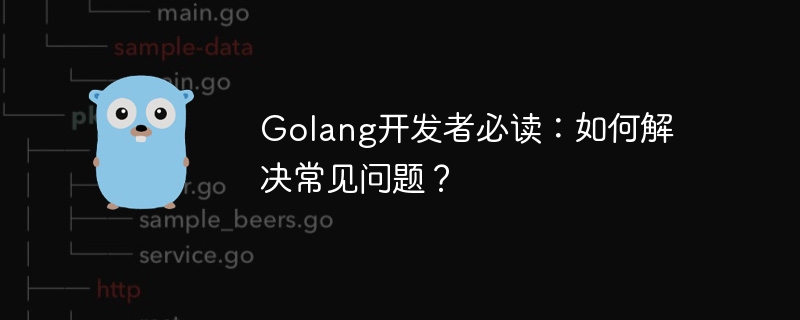

Golang developers must read: How to solve common problems?
In the process of Golang development, developers often encounter some common problems and challenges. This article will provide solutions to some common problems and provide specific code examples to help developers better understand and apply them.
In Golang, concurrency is a major feature, but it can also easily lead to problems, such as race conditions and deadlocks. In order to solve these problems, you can use Mutex in the sync package provided by the Go language for concurrency control.
package main
import (
"fmt"
"sync"
)
var count int
var mutex sync.Mutex
func increment() {
mutex.Lock()
defer mutex.Unlock()
count++
}
func main() {
var wg sync.WaitGroup
for i := 0; i < 1000; i++ {
wg.Add(1)
go func() {
defer wg.Done()
increment()
}()
}
wg.Wait()
fmt.Println("Final Count:", count)
}In the above code example, we used sync.Mutex to protect the concurrent modification of the count variable to ensure that no race conditions occur.
Memory leaks are a common problem, especially in long-running services. In order to avoid memory leaks, we can use the net/http/pprof package provided by the Go language to perform performance analysis and find memory leaks.
package main
import (
"log"
"net/http"
_ "net/http/pprof"
)
func handler(w http.ResponseWriter, r *http.Request) {
for i := 0; i < 10000; i++ {
// 进行大量内存分配操作
_ = make([]byte, 1024)
}
w.Write([]byte("Hello World"))
}
func main() {
go func() {
log.Println(http.ListenAndServe("localhost:6060", nil))
}()
http.HandleFunc("/", handler)
http.ListenAndServe(":8080", nil)
}In the above code example, we introduce the net/http/pprof package and start the performance analysis server in the main function, which can be passedlocalhost:6060/debug/pprof to view the performance data of the application and discover memory leaks.
Error handling in Golang is a major focus. Good error handling can improve the reliability and stability of the program. Use the errors package to define and handle custom errors, and combine the defer and panic/recover mechanisms to better handle exceptions.
package main
import (
"errors"
"fmt"
)
func divide(a, b int) (int, error) {
if b == 0 {
return 0, errors.New("division by zero")
}
return a / b, nil
}
func main() {
defer func() {
if r := recover(); r != nil {
fmt.Println("Recovered:", r)
}
}()
result, err := divide(6, 0)
if err != nil {
panic(err)
}
fmt.Println("Result:", result)
}In the above code example, we defined a divide function to perform division and return a custom error if the divisor is 0. By using panic and recover combined with the defer mechanism, exceptions can be better handled.
Through the solutions and specific code examples mentioned above, we hope to help Golang developers better solve common problems and challenges. And in actual development, we must pay attention to good coding habits, standardized error handling, and efficient concurrency control to ensure the stability and reliability of the program. I wish all Golang developers to write excellent programs!
The above is the detailed content of An essential guide to solving common problems faced by Golang developers. For more information, please follow other related articles on the PHP Chinese website!
 Usage of Type keyword in Go
Usage of Type keyword in Go
 How to implement linked list in go
How to implement linked list in go
 What are the Go language programming software?
What are the Go language programming software?
 How to learn go language from 0 basics
How to learn go language from 0 basics
 How to define variables in golang
How to define variables in golang
 What are the methods to implement operator overloading in Go language?
What are the methods to implement operator overloading in Go language?
 What are the operators in Go language?
What are the operators in Go language?
 What are the data conversion methods in golang?
What are the data conversion methods in golang?




